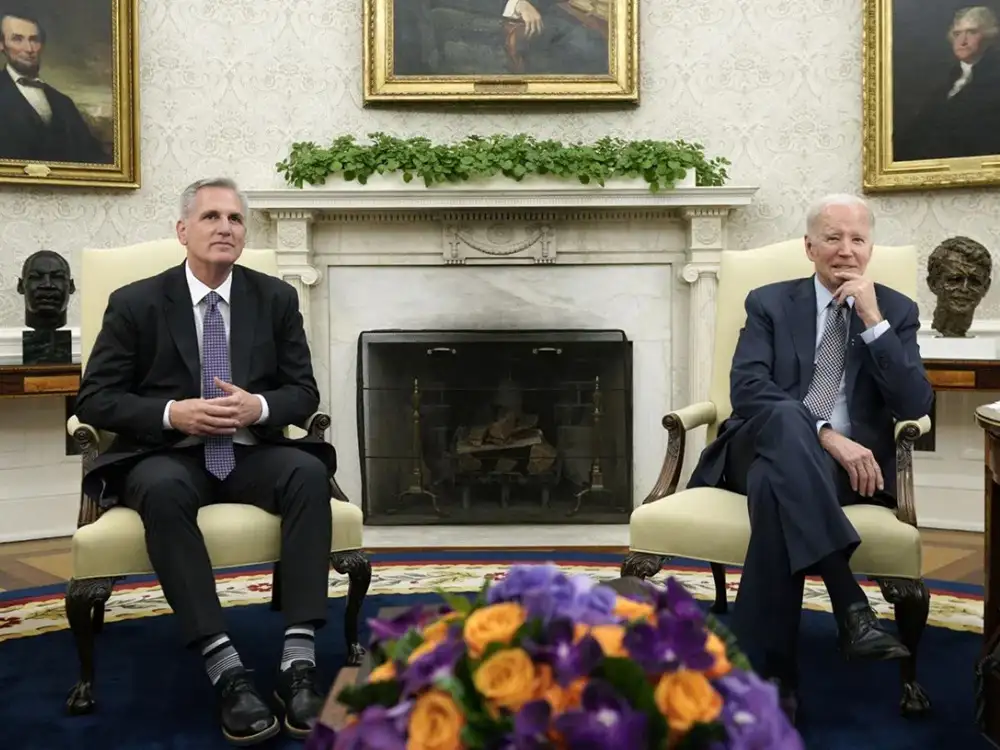President Joe Biden and House Speaker Kevin McCarthy engaged in direct negotiations on Monday to address the pressing issue of raising the federal government’s debt ceiling. With the country on the brink of defaulting on its bills, the meeting took place amidst mounting urgency to find a resolution before the June 1 deadline. The discussions marked a notable shift in tone after earlier disagreements between McCarthy and Biden, highlighting the roller-coaster nature of the negotiations.
Following a productive conversation with President Biden as he returned from an international summit in Japan, McCarthy expressed cautious optimism, stating, “I think we can solve some of these problems if he understands what we’re looking at.” However, he emphasized that there was no agreement as yet and that significant differences still existed between the parties.
The negotiations revolve around raising the current $31.4 trillion debt limit and determining the length of the budget caps. Failure to reach an agreement would lead to an unprecedented default, causing severe economic consequences both domestically and internationally.
House Republicans, in exchange for raising the debt ceiling, are pushing for spending cuts and policy changes, particularly focusing on aid programs and government permits. President Biden, on the other hand, has expressed openness to negotiations but has also called for tax increases as part of the deal.
To ensure preparedness for Monday’s meeting, Office of Management and Budget Director Shalanda Young and White House adviser Steve Ricchetti met with Republican Representatives Garret Graves and Patrick McHenry on Sunday. The aim was to align positions and facilitate a constructive dialogue between President Biden and Speaker McCarthy.
The path to reaching a legislative deal that can pass through Congress and be signed into law may take several days. Despite the time constraints, McCarthy expressed confidence that a compromise could be reached within the available timeline.
The consequences of a default would be significant, prompting both sides to continue negotiations in order to prevent such an outcome. Treasury Secretary Janet Yellen has warned that the country will run out of funds to pay its existing obligations as early as June 1.
President Biden, speaking before his conversation with McCarthy, stressed the need for a bipartisan agreement. He criticized Republicans for their “extreme positions” on raising the debt ceiling and called on them to move beyond partisanship. Biden highlighted specific issues, such as tax breaks for the oil industry, which he deemed unacceptable, particularly in light of potential risks to healthcare and Medicaid.
Initially resistant to negotiating on the debt limit, President Biden has since agreed to engage in budget talks alongside raising the debt ceiling. The decision to directly negotiate with McCarthy was made after the House Speaker indicated that discussions would be put on hold until Biden’s return from overseas.
Despite expressing confidence that an agreement could be reached, President Biden acknowledged the possibility that Republicans might force a default by taking extreme actions. He emphasized the need for both sides to make concessions and find common ground.
Republicans argue that they have already taken steps to address the issue by passing a bill to raise the debt ceiling, cut spending, and reverse key Biden policies. However, Democrats quickly rejected this proposal, further complicating the negotiations.
A major point of contention in the negotiations is revenue growth, with Republicans opposing President Biden’s proposed tax increases. While Biden has indicated a willingness to consider spending cuts alongside revenue increases, significant disagreements persist in this area.
The possibility of using the 14th Amendment, which states that public debt “shall not be questioned,” to bypass the debt ceiling has been discussed. However, Biden acknowledged that this approach could lead to a court challenge and subsequent appeal, potentially exacerbating the risk of default.
The ongoing debt ceiling debate has been unfolding against the backdrop of President Biden’s trip to Hiroshima, Japan, where he met with G7 and allied leaders. The negotiations have attracted attention even as the president grapples with other pressing international issues, such as sending F-16 fighter jets to Ukraine and addressing relations with China.
While the negotiations remain challenging, the urgency to prevent a default and the willingness of both parties to engage in direct discussions offer hope for a resolution. The coming days will be crucial in determining the outcome and ensuring the financial stability of the United States.



